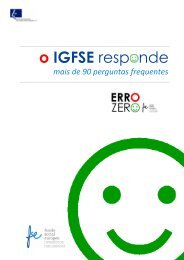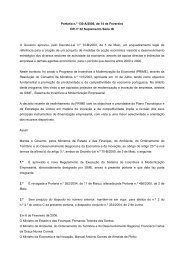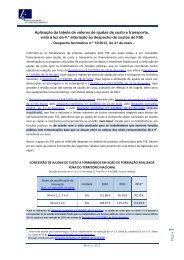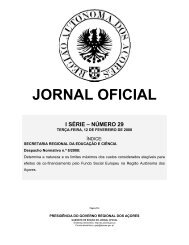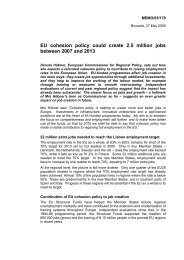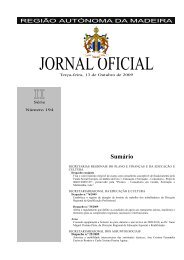Industrial Relations in Europe 2012 - European Commission - Europa
Industrial Relations in Europe 2012 - European Commission - Europa
Industrial Relations in Europe 2012 - European Commission - Europa
You also want an ePaper? Increase the reach of your titles
YUMPU automatically turns print PDFs into web optimized ePapers that Google loves.
SK 2011:<br />
cuts/freeze<br />
planned<br />
SI<br />
2009: wage<br />
moderation<br />
agreement<br />
wage growth for<br />
2009 reduced<br />
from 9.9% to<br />
7.1%<br />
The <strong>2012</strong> Public<br />
f<strong>in</strong>ance balance<br />
act decreased<br />
wages <strong>in</strong> the<br />
public sector by<br />
8% on average.<br />
uniformisation<br />
of the pay<br />
scale<br />
2010-2011:<br />
partial<br />
measures for<br />
curb<strong>in</strong>g<br />
employment <strong>in</strong><br />
the public<br />
sector<br />
<strong>2012</strong>: Public<br />
f<strong>in</strong>ance<br />
balance Act:<br />
no new<br />
recruitment <strong>in</strong><br />
the public<br />
sector foreseen<br />
10/2010: private and public<br />
sector demonstration<br />
11-12/2011: doctors'<br />
successful mass resignation<br />
campaign for higher wages<br />
and reversal of hospital<br />
corporatisation<br />
10/2010: public sector strike<br />
04/<strong>2012</strong>: general strike of<br />
teachers and police<br />
demonstration, but major<br />
trade unions promised not to<br />
call a referendum on<br />
austerity measures (<strong>in</strong><br />
Slovenia referendums are<br />
easy to call, this is also an<br />
often used weapon of unions<br />
aga<strong>in</strong>st the government). In<br />
May <strong>2012</strong>, after a month of<br />
negotiations, an agreement<br />
on austerity measures <strong>in</strong> the<br />
public sector was signed by<br />
government, employers and<br />
trade unions.<br />
After 2010, political action and strikes further <strong>in</strong>tensified <strong>in</strong> healthcare, education and other<br />
subsectors of public service. In Poland, the fire fighters’ trade union voiced dissatisfaction<br />
with work<strong>in</strong>g time regulation concern<strong>in</strong>g fire fighters. In Hungary, public sector trade unions<br />
protested aga<strong>in</strong>st pension cuts for armed forces, police officers and fire fighters. In Slovakia,<br />
trade unions <strong>in</strong> the education sector went on strike before the government agreed to negotiated<br />
wage <strong>in</strong>creases for teachers. In late 2011, the trade union represent<strong>in</strong>g medical doctors <strong>in</strong><br />
Slovakia threatened a walkout of doctors <strong>in</strong> order to obta<strong>in</strong> wage <strong>in</strong>creases and stop the<br />
process of transform<strong>in</strong>g state-run hospitals <strong>in</strong>to public corporations. Fac<strong>in</strong>g the threat of<br />
enormous shortages of hospital doctors, the government agreed to substantial wage <strong>in</strong>creases.<br />
Follow<strong>in</strong>g this action, the Chamber of nurses and midwives also submitted a petition for wage<br />
<strong>in</strong>creases, which was successful. Czech trade unions <strong>in</strong> public healthcare engaged <strong>in</strong> similar<br />
action <strong>in</strong> 2010 and 2011 to obta<strong>in</strong> wage <strong>in</strong>creases and secure fund<strong>in</strong>g for public hospitals. 28<br />
In Romania, public discontent with austerity measures produced a large union-led protest <strong>in</strong><br />
2010 aga<strong>in</strong>st cuts <strong>in</strong> pensions and salaries. Earlier <strong>in</strong> 2010, the Romanian national trade union<br />
confederations set up a national crisis committee to harmonise the trade unions’ response to<br />
the government’s anti-crisis measures, especially those <strong>in</strong>cluded <strong>in</strong> the agreement with the<br />
IMF, the <strong>Europe</strong>an <strong>Commission</strong> and the World Bank. 29 After the unions accused the<br />
government of ignor<strong>in</strong>g social dialogue, more than 60,000 union members and supporters<br />
protested aga<strong>in</strong>st the proposed wage and welfare cuts. The five largest trade union<br />
28 Source: http://www.eurofound.europa.eu/eiro/2011/12/articles/cz1112029i.htm<br />
29 Source: EIRO at http://www.eurofound.europa.eu/eiro/2010/05/articles/RO1005019I.htm<br />
107



